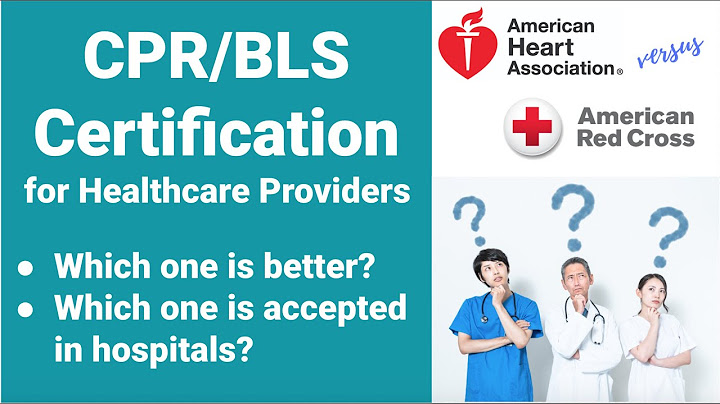CPR certifications aren't valid forever. If your workplace requires you to become CPR certified, you will need periodical renewal / recertification. Depending on who the provider is through who issued your certification, it will most likely be valid for one or two years. When your certification is within six months of expiring, it's time to think about your options for renewal. Show If you are not required for work to maintain a CPR certification, you may think that just taking one CPR course and learning the procedures once is sufficient. Here are a few reasons why you may want to consider a renewal. The American Heart Association (AHA) has led the initiative of keeping CPR performance standards and guidelines as up-to-date as possible. As a result, when new research shows that current CPR practices should be modified to improve their effectiveness, this information is included in all courses moving forward. However, anyone who has taken a CPR class previous to when those changes were implemented into the curriculum will most likely not be notified of the changes unless they attend another training course. For example, the original ABC of CPR (airway, breath, compressions) was recently reordered and is now taught as CAB (compressions, airway, breath). Additionally the number of breaths and compressions was also changed in the CPR training curriculum to better reflect what research had shown to be most effective. Both of these changes are clearly important updates that the AHA would want all people trained in CPR to be aware of. Another reason to consider renewing your certification is simple: memory. How confident are you about your performance of a skill you learned and practiced for an hour 1-2 years ago? Probably not very confident! The fact is that CPR, despite being an extremely valuable tool, in most cases is not used very often. And you've heard the phrase use it or lose it. Taking a renewal course gives you the opportunity to practice the skill all over again, just to refresh your memory on the concepts and physical components of CPR. This is valuable practice so that in an emergency situation you won't have to do as much thinking and struggling to remember. You may now be convinced that it's a good idea to renew your CPR certification. But where do you do so? And what if yours is already expired? Or what if you've moved to a different state than where you received your current certification? These are all important questions, so let's talk about some of the logistics involved here. Where can I renew my CPR certification?If your employer requires you to be CPR certified, they will offer a selection of renewal courses that you can attend. Even if your job doesn't require you to be CPR certified, your company may still offer CPR courses to employees who are interested, as part of their disaster preparedness planning. Talk with the Human Resources department to find out more details. If CPR courses aren't offered in your workplace, you have a few other options:
What if my CPR certification is already expired?If your certification is more than 30 days expired, you are no longer eligible to take a renewal or challenge course, but rather will need to take a full certification course again either in-person or online. I moved to a different state after receiving my CPR certification. What should I do?CPR certifications from countries outside the US are not recognized in the US, but if you were certified in one US state and moved to another US state then your certification is still valid up the expiration date. Also important to mention are the two different kinds of renewals that are available. There are renewal courses which, as the name indicates, include an abbreviated review of the information from a standard course. Another option is a challenge course, which has no review, but rather is just a test of your knowledge and ability to perform the skill correctly. Stay current on your CPR certification. It won't take much time, and when faced with an emergency situation, it will pay off BIG! While at it, also read The power of a CPR Card
CPR Techniques Continue to EvolveMouth-to-mouth resuscitation first became an accepted method for reviving victims of drowning in the 1700’s, but it took nearly two hundred years for doctors to fully understand and start implementing chest compressions to victims of sudden cardiac arrest. The science behind saving lives with cardiopulmonary resuscitation (CPR) continues to evolve to this day. Doctors, medical scientists, and organizations like the American Heart Association gauge current practices and test techniques to ensure as many lives are saved as possible. In order to stay current with the latest, most effective technique, it’s vital that you renew your certification every two years. Practice Makes PerfectIf you’re not an emergency responder or in the medical field, it’s likely you haven’t even thought about CPR training since your last class. Practicing every two years at your renewal-training course will help commit the training to memory, but the physical act of practicing CPR is just as important. Developing muscle memory around the physical components associated with CPR will help ensure you’re able to react quickly and correctly in a crisis situation. According to the American Heart Association, retention of CPR skills is a major issue and unused CPR skills may start deteriorating within six months of initial training. You May Have To Save A Life!Nearly 100,000 lives are saved every single year with CPR, but nearly two thirds of sudden cardiac arrest victims never receive CPR. Even if your training is getting a bit rusty, your ability to do chest compressionsmay very well save someone’s life. Only a small percentage of people in the U.S. hold active CPR certifications, and an amazing 70% of people don’t know what to do when CPR is needed, so it may be up to you to step in and help save someone’s life. You never know when you’ll need CPR: Where Do I renew my CPR Certification?The CPR Consultants offer Basic Life Support CPR renewal classes in Richmond, VA as well as Raleigh, NC., but we also offer a variety of other course, as well as some online training; however, all official CPR certification training courses require hands-on manikin skills testing. Contact us if you’d like to schedule a CPR renewal or are interested in learning more about one of our first aid, CPR or other lifesaving courses. How long do most CPR certifications last?After successfully completing CPR training, your certification will be good for two years. After that, you can extend your certification and stay up to date on the latest techniques through abbreviated CPR and First Aid renewal classes. Look for courses marked “Review” or “Challenge.”
Does CPR have to be done every year?The CPR component should be refreshed every 12 months, while the renewal of the full certificate should be done every 3 years.
How often does CPR need to be refreshed?Refresh your first aid skills every year
St John Ambulance recommends refreshing your first aid training every 12 months to ensure your first aid skills are kept current and to maintain the confidence to deliver first aid in an emergency situation.
How often do you need to do CPR?The optimal interval for retraining has not been established, however, it is now well accepted that to hold a current CPR certificate in a workplace you are required to undertake CPR training every 12 months.
|

Related Posts
Advertising
LATEST NEWS
Advertising
Populer
Advertising
About

Copyright © 2024 muatrau Inc.



















